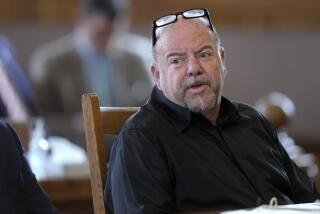Phone carriers can’t block calls over fees
- Share via
WASHINGTON — Large phone companies can’t block customers from dialing up free services, such as conference calling or chat lines, to avoid the exorbitant fees that small phone carriers charge the larger companies to complete the calls, federal regulators said Thursday.
The ruling was a partial victory for the small companies that provide those services, including FreeConference.com of Los Angeles and FreeConferenceCall.com of Long Beach.
But the Federal Communications Commission also said it would investigate 39 rural carriers because of “substantial questions” about the rates they have been charging to connect customers to those services through the lines of the major phone companies.
AT&T; Corp., Sprint Nextel Corp., Verizon Communications and Qwest Communications International Inc. have charged the rural carriers with “traffic-pumping” schemes that use arrangements with free services to boost their call volume.
The FCC suspended the rates charged by the rural carriers pending the outcome of the investigation.
“By launching an investigation to address the lawfulness of these rates, the FCC sent a strong signal that these traffic-pumping scams are illegal and will not be permitted,” AT&T; spokesman Michael Balmoris said.
The controversy erupted this spring as thousands of people complained to the FCC that they were blocked when they tried to call the free conferencing services, which route their calls through rural phone carriers. In exchange, the conferencing services get a cut of the fees the rural carriers charge large phone companies to complete the calls.
Some of the major phone companies said they had the right to block those calls. But this spring they agreed to stop as customers complained and the FCC promised to look into the matter.
The FCC’s Wireline Competition Bureau said Thursday that blocking calls was not a proper “self-help” remedy for potentially inflated access rates.
Many of the rural carriers are in Iowa, which deregulated pricing controls for free consumer calls in the 1990s. AT&T; complained to the FCC in April that its monthly bill from one small Iowa carrier, Superior Telephone, skyrocketed from $2,000 to $2 million in 2006 as calls from people around the country rolled in to free conferencing services.
--
More to Read
Inside the business of entertainment
The Wide Shot brings you news, analysis and insights on everything from streaming wars to production — and what it all means for the future.
You may occasionally receive promotional content from the Los Angeles Times.











